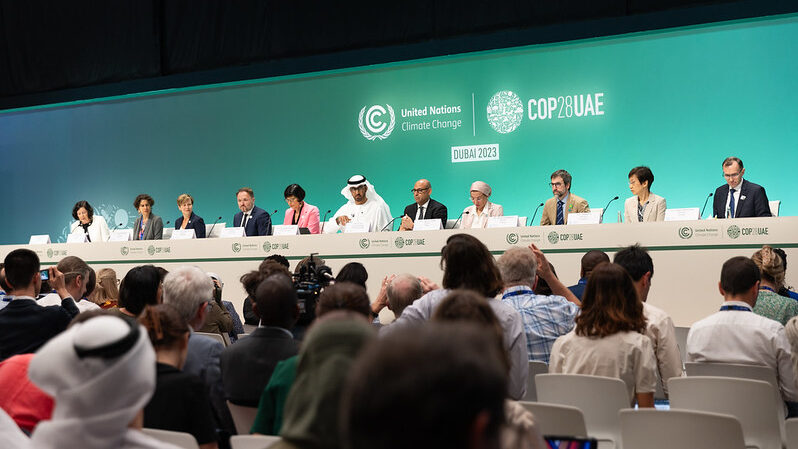A new version of the centerpiece text being discussed at Cop28 – the global stocktake – dropped on Friday afternoon. And it’s grown by three pages.
Everything is still on the table.
On fossil fuels, there are four choices. All are anchored around a “phase out”, with reference, variously, to “the best available science”, 1.5C, the Paris Agreement, “unabated”, peak consumption, and net zero CO2 emissions.
None explicitly refers to justice, equity, or differentiated pathways for developed and developing countries, campaigners noted – which may be a sticking point for the latter group.
Like its previous iteration, every paragraph comes with a “no text” choice. It leaves the door open to binning the entire energy package, including the tripling of renewable energy capacity and doubling of efficiency by 2030. That’s a possibility a group of countries, including Saudi Arabia, China, India and Iraq, floated two days ago.
Countries’ positions are still far apart, it was clear in a plenary on Friday morning.
Samoa, on behalf of small island states, not only pushed for a phase out, but an end to new investment in fossil fuel infrastructure – a Cop first.
Bolivia, on behalf of “like-minded” developing countries, and Saudi Arabia, on behalf of the Arab Group, said any agreement should focus on limiting emissions and not their sources. In a fiery speech, the Bolivian negotiator said his group would not “compromise our right to development”.
The most practical way to build a bridge is with finance, observers told Climate Home. Developing countries want to know money will be available to support an ambitious outcome.
Ministers, assemble
As usual, the Cop presidency has tasked pairs of developed and developing country ministers to chat with their peers and resolve the thorniest issues.
After hurrying through a back door from the plenary yesterday afternoon, Sultan Al Jaber lined up in the unimaginatively named press conference room 1 with his chosen eight.
Despite rumours of changes to the line-up, they are the same eight who have been coordinating talks since September – much longer than they’re usually assigned for.
Leading on the global stocktake are South Africa’s Barbara Creecy and Denmark’s Dan Jorgensen. Egypt’s Yasmine Fouad and Canada’s Steven Guilbeault lead on means of implementation – money, to you and me.
Singapore’s Grace Fu and Norway’s Espen Barth Eide will lead on mitigation while Chile’s Maisa Rojas and Australia’s Jennifer McAllister lead on adaptation.
The group are mainly veterans, having taken similar roles at Cop26 and Cop27. It includes two IPCC authors (Fouad and Rojas), a former rabble-rousing campaigner (Guilbeault) who has been to every Cop and an accountant who flew high in the corporate world before going into politics (Fu).
On top of this, the presidency has asked a number of nations including Canada to help him gather ideas on the most high profile issue – fossil fuel phase-out.
Beside his fellow ministers at the press conference, Jorgensen offered some motivational words. “Words on a piece of paper will not in itself save the climate, he said, “but if we agree, if we decide, we can make these words carry weight, make them instigate real change, and make a real difference.”
Activists to call for Gaza ceasefire
In Gaza, the Israeli military has now killed 17,000 people, a more than tenfold retaliation for the 1,200 Hamas killed in its 7 October incursion.
Israeli officials estimate a third of the dead in Gaza were combatants, meaning the majority of victims were civilians by any count.
In Dubai, activists want an end to the violence. They accuse the UN climate body (UNFCCC) of repressing their gestures of solidarity, with keffiyehs confiscated and Palestinian flags banned.
The head of War on Want Asad Rehman told reporters on Friday campaigners will hold a banner saying “ceasefire now, end occupation” at a march at 3.30pm today.
“If we’re going to be prevented of course that will be a serious problem,” Climate Action Network head Tasneem Essop said, wearing a keffiyeh and one of the lanyards the Palestinian pavilion are giving out in their national colours.
Rehman and Essop claimed the UNFCCC banned the phrase “ceasefire now” in demonstrations at the venue. A UNFCCC spokesperson denied this.
Waving any flag is prohibited by order of the UN Office of Safety and Security in New York. It made that directive on 7 October, the day Hamas attacked Israel.
Essop said that protesters will use the symbol of the watermelon instead – a fruit of black, white, red and green which has long been a stand-in for the Palestinian flag.
In brief
Put a lid on it – The Canadian government has proposed a cap on emissions from the oil and gas sector, which accounted for 28% of national emissions in 2021. The draft regulation needs parliamentary approval. Campaigners celebrated the move, while calling for tighter targets.
Corporate watch – Less than 10% of corporate delegates at Cop28 represent companies with science-based emissions targets, according to Influence Map. Ikea, Iberdrola and Unilever are among the climate leaders, while Gazprom, Adnoc, ExxonMobil and Toyota are the most misaligned companies with a major presence.
Paris anniversary present? – The Cop28 presidency is keen to finish on 12 December: the scheduled end date and precisely eight years after the Paris Agreement was adopted. It started cleanly, with no agenda fight. Can it be the first to end punctually since Cops were in single digits?
